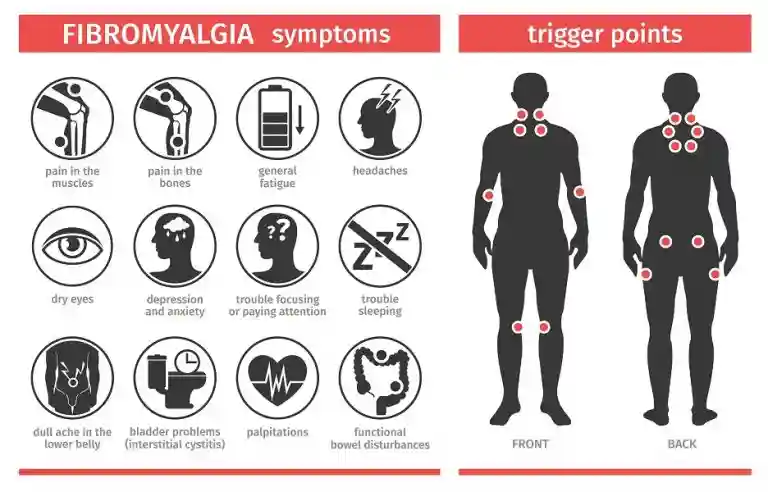Covid-19, as we all know, shows side effects even after you’ve had the infection. It can trigger painful fibromyalgia, a rheumatic condition characterized by joint stiffness and pain, fatigue, irregular sleep patterns, and muscle aches. Read on to know more.
Those who have battled Covid-19 are aware of the various complications that can arise in the post-Covid stage. From fatigue, shortness of breath, headaches, sleep troubles to low energy levels, there are so many symptoms that people have been experiencing, even after having the viral infection.
But if you’re experiencing symptoms like joint pain, memory problems, severe fatigue, or sleep problems, you could be suffering from fibromyalgia.
Fibromyalgia is a pain syndrome characterized by chronic pain, fatigue, and tenderness. It causes aches and pain throughout the body. In fact, fibromyalgia’s symptoms are often confused with arthritis or joint inflammation. However, unlike arthritis, it hasn’t been found to cause joint or muscle inflammation and damage.
Dr. Bipin Jibhkate, a consultant of critical care medicine, and ICU director at Wockhardt Hospital, Mira Road, says fibromyalgia is a painful condition, and the pain is usually in the soft tissue, nerves, and muscles of your body. Pain is the most common symptom.
What are the symptoms of fibromyalgia?
Dr. Jibhkate reveals that sleep troubles, muscle, and joint pain, as well as fatigue, are the major symptoms of this condition. Apart from these, this condition is often accompanied by:
- Depression and anxiety
- Trouble in concentration (cognitive difficulties)
- Irritable bowel movement
- Widespread pain
- Tingling and numbness in the hands and feet.
What causes fibromyalgia?
The exact cause of fibromyalgia is unclear; there could be different causes for different people. It has been shown to be genetic. But Dr. Jibhkate says this condition can frequently become evident if you’re dealing with:
- Stressful events
- Chronic pain of rheumatoid arthritis
- Autoimmune diseases such as lupus
These are some risk factors that can trigger the development of fibromyalgia.
How is fibromyalgia diagnosed?
Dr. Jibhkate says it’s not easy to diagnose the disease because there are no specific tests. But a doctor will suspect fibromyalgia based on your symptoms. And because widespread body pain is the key feature of fibromyalgia, healthcare providers will ask you to describe your pain, so that the healthcare provider can differentiate between fibromyalgia and other diseases with similar symptoms.
Is fibromyalgia a treatable disease?
Although fibromyalgia can affect the quality of life, it is still treatable disease. Dr. Jibhkate says that fibromyalgia is not a life-threatening disease, but the recovery of the patient can be delayed. Therefore, the patient should not miss the treatment in the middle, or else it may worsen your symptoms.
It isn’t just medicine that can treat the disease, there is also a non-drug method to treat fibromyalgia, adds the expert.
Here’s how to manage fibromyalgia with lifestyle changes:
According to Dr. Jibhkate, there are four major triggers or risk factors of fibromyalgia that need to be kept under control, if you want to manage the condition. These are:
- Poor diet
- High-stress levels
- Mood
- Poor quality sleep
By keeping in mind these triggers, Dr. Jibhkate shares these tips to manage fibromyalgia:
1. Modify your diet: Avoid junk and fried foods. Instead consume high-energy foods that are low in sugar such as green vegetables, fruits, nuts, and seeds. These foods can help your energy levels stay high throughout the day.
2. Stay active: Research shows that the most effective treatment for fibromyalgia is physical exercise. Carrying out gentle aerobic exercise helps with pain and fatigue symptoms.
3. Prioritise sleep: Unrelenting pain can disrupt sleep, which can lead to increased aches and fatigue, which then creates a vicious cycle. Apart from exercise, getting enough sleep is really important, when it comes to fibromyalgia. You can meditate, in order to improve your sleep pattern.
4. Limiting alcohol: Excess alcohol and caffeine intake can disturb your sleep cycle, and sleep deprivation can lead to fatigue, which can worsen the symptoms of fibromyalgia. So, limit your alcohol intake.
5. Stress reduction: When you constantly battle pain, it can place a lot of stress on your system. Finding easy ways to relieve stress can make a huge difference to your fatigue levels. You can do activities like tai chi, meditation, morning walks, breathing exercises, and gently stretch your body to reduce stress levels.
So, follow these tips and manage your fibromyalgia symptoms.


















